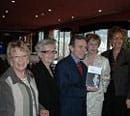“Everything that isn’t measured doesn’t exist!” Thus began the informal interview with Michel Lejoyeux, Professor of Medicine at Université Paris VII and Head of the Psychiatry and Addiction Medicine department at Bichat Hospital upon his arrival. The author of a study titled “From Pleasure to Dependence: New Addictions, New Therapies” (Editions de la Martinière) was indeed the guest at the annual conference of the “Mazal Tov” Lodge of B’nai B’rith, a paramasonic circle exclusively of Hebrew observance, of which Freud, the founder of psychoanalysis, was himself a diligent member in Vienna. This organization, celebrating its 165th anniversary – 75 years in France – and whose “renaissance in 1947 with the survivors of the Holocaust,” recalls its current president Jeannine Weiler, has allowed it to expand into 58 countries and to obtain NGO status at the UN, within the European Union, and Mercosur. Paramasonic, as the terms used by the president heavily echo the rules of traditional lodges: the B’nai B’rith thus aim to be a “bridge between the Jewish world and all those who seek enrichment through difference,” and the “Mazal Tov” Lodge presents itself as “one of the links in this organization driven by a fraternal spirit.” Jeannine Weiler further indicates that solidarity is not addressed only to representatives of the Jewish Community: with the profits from the previous year’s work, a donation was made to Lenval Hospital at the same time as to the “Tsedek” Association in Jerusalem, enabling “to offer Palestinian and Israeli children a stay away from the rockets falling on Sderot.” The future is secure as alongside the founding Lodges, there now exist “younger lodges” but “driven by the same passion to promote identical objectives.”
After a “kosher” brunch, the speaker developed the main themes of his specialty before the many guests in the panoramic room of the Aston Hotel, notably based on the controversial figure of Marilyn Monroe in his introduction. “Marilyn,” explained Michel Lejoyeux, “is a good model because all women wanted to imitate her.” But she is also a “typical case of dependence.” First, he jokes about the “dependence on champagne.” And he recounts how, when she would go to see her therapist, she “brought a bottle she asked him to chill for the end of the session”! Dependent, she also was “on sedatives, tobacco, and love.” “Dependencies or addictions,” the author clarifies, who as an apostle of “American criteria and classifications” rejects the term ‘habituation,’ “used only by the French and therefore of limited value.”
Indeed, states the Head of Service at Bichat, there exist “medically listed addictions, ‘classical’ such as alcohol or tobacco.” And the specialist specifies that according to the Academy of Medicine as well as the WHO, to “not be pathological,” consumption should not “exceed two glasses of wine for regular meals and four glasses for an occasion.” Regarding tobacco, “one is addicted from the first consumption since the cigarette manufacturers arrange to put the most addictive substances in the product.” Not forgetting to mention “eating disorders” (anorexia and bulimia) which allow him to define dependency: “it’s when pleasure is replaced by the obligation of repetition of the behavior.” Alongside these “recognized” addictions exist many others. Gambling since, he jokes, it hasn’t escaped your notice that in Nice, there are numerous casinos.” But also “the Internet,” “shopping,” and “hypochondria, a form of dependence on medicine.” And the author to highlight the difficulties in escaping “the pressures of social image, the paradigms of the consumer society, and the temptations of unlimited Internet.”


